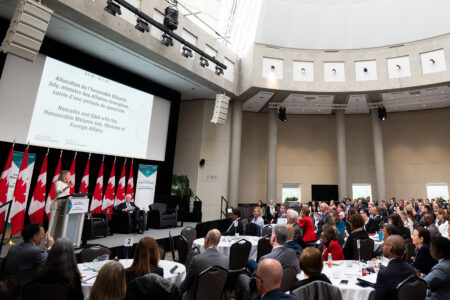
In this month of September, more than 100 heads of government are to attend UN meetings to discuss organizational reforms. It would take reform of the most massive and comprehensive nature to restore the UN to serious credi- bility. Secretary-General Kofi Annan’s March reform proposal is more of an illustration of someone reading the handwriting on the wall when his back is up against it than a proposal that will satisfy the UN’s critics, of which there is no shortage in Washington on either side of the partisan political fence.
By being something for everyone, the Annan reform pack- age will end by satisfying no one sufficiently to secure the endorsement that Annan seeks. By seeking, among other things, agreement to a global convention against terrorism, a restructured Security Council, commitment by rich countries to provide 0.7 percent of their GNP to developing countries, and a totally revised Commission on Human Rights, Annan wants the equivalent of a functional illiterate to write Nobel Prize-winning – literature. If 70,000 dead in Darfur are not enough to convince the UN that genocide is occurring, what hope is there for solv- ing hard questions of money and national prestige?
Essentially, the UN resists the reality of US power. Or rather, it wishes the US to use its power only for UN- endorsed objectives. Many of its members reject US objec- tives, either because those objectives threaten their illegitimate regimes or because supporting US objectives would enhance further US power, which is not in their national interests. The US has declined to be the ox for the UN plow, and has deferred to UN desires the pursuit of its national objectives as Washington perceives them. These dichotomies lie at the root of US-UN tensions. They are, however, exacerbated by the UN’s institutional inadequacies that are partly structural and partly personalized.
If the United Nations is to ”œwork” as a player in global affairs, the prevailing view in Washington is that it must first regain stature in the eyes of the United States. While many regard this as American hubris, it’s more like a bald statement of political reality. A substan- tial portion of the US political class has simply given up on the UN.
The essential requirement for a politically relevant United Nations is to re-engage the United States. The US has been affected and disaffected with the UN in cyclical fashion throughout the organization’s history. At its inception, the US was haunted by the guilt of the easily guilt-ridden after the US refusal to support the League of Nations had led to its failure and eventually the Second World War. President Roosevelt didn’t want another Versailles in San Francisco and the US threw itself into the process of the UN’s creation, designing an organization and structure that would indeed keep the peace. It was a victor’s organization reflecting the interests of the allies ”” no matter how weakened (UK, France), battered (USSR), or falter- ing (the Republic of China).
This was the United Nations that the Truman administration rallied in 1950 to oppose North Korea’s inva- sion of the South. It has been some- what downhill from there. With the ever-burgeoning dimensions of the General Assembly came axiomatic majorities often rallied against the United States for whatever happened to be the issue of the day. As a conse- quence, the US largely ignored the Assembly and worked within the Security Council to prevent the issue of the moment from gaining traction. The UN was simply another Cold War forum in which jaw-jaw substituted for war-war (or at least most of the time). The UN was a talk shop; if there was politico-military heavy lifting tobe done, the US went to the NATO Alliance ”” which was doing the seri- ous business of keeping the Soviets from conquering Europe.
With the end of the Cold War, the US took another look at the United Nations. Perhaps, just perhaps, it might develop into an organization that could do something serious con- cerning peacekeeping. And, indeed, when faced with the Iraqi invasion of Kuwait, the UN endorsed action to drive Iraqi forces from Kuwait, albeit refusing to countenance an invasion of Iraq. So, at the end of Operation Desert Storm in 1991, there was a bril- liant tactical success in liberating Kuwait that left pending the chore of curbing Iraqi aggression.
But if there were potential for UN peacekeeping following Desert Storm, it quickly ran into the sands. There was disaster in Somalia; there was utter genocidal catastrophe in Rwanda. The UN was unable to cope with the disin- tegration of the former Yugoslavia. It fumbled opportunities to assist in Haiti. And, finally and most recently, in official Washington’s view, it worked to thwart US efforts to enforce UN resolutions and/or ultimately implement ”œregime change” in Baghdad.
Many in the US are now convinced that the UN is not just the corrupt and incompetent organization that it has been so frequently, but now also a mechanism that is acting to combat US interests wherever they fail to align with ”œold Europe” and third-world desires. And particularly the UN demonstrates relentless hostility to Israel.
It may be unfair, but Secretary- General Kofi Annan is regarded as the first part of the problem. Annan was once the Clinton administra- tion’s choice over a second term for Boutros Boutros-Ghali. He is no longer held in much regard, and his connection, albeit tenuous, with the vast fraud associated with the Iraq ”œoil for food” program cost him any residual sympathy.
Nevertheless, whether Kofi Annan is personally responsible for the oil-for- food corruption or profited directly from it is irrelevant. There are enough loops of fiscal cut-outs, hidden bank accounts, plausible denial, and out- right deceit to make ”œAdscam” look puerile. But by being in command, the SG is responsible. Yet even the Bush administration has stopped short of demanding his dismissal, though it is unlikely to support him for another five years in office when his term expires at the end of 2006.
It is one thing to say ”œbe gone” and another to decide on a replacement. In this regard, there have been musings that the next SG should be an Asian. There have been since 1945, four Europeans, two Africans, an Asian, and a Latin American. Perhaps the next SG should be a North American: the one conti- nent that has never had a secretary- general. In this regard, there really are two ”œNorth American” countries: Canada and the United States.
If we are looking for a strong Canadian candidate for SG, there are two obvious individuals: former prime ministers Brian Mulroney and Jean Chrétien. Mulroney’s recent illness is one obvious obstacle, as is his accept- ability to the ruling Liberal party. Chrétien has not distinguished him- self in foreign affairs ”” and is unac- ceptable to the US, specifically to President Bush.
Traditionally, the United States has been excluded from supplying senior leaders for various major institutions due to the perception that the US already is too powerful. Thus there has never been a US pope, head of the UN or NATO (though there has always been a US general in command). But perhaps it is time to cast aside old paradigms and to suggest that a US secretary-gen- eral would be the ideal messenger to re- engage the United States in UN activity.
For the United States, the obvious candidate is former president William Jefferson Clinton, whose intelligence, political acuity, empathy and energy have never been doubted ”” regardless of US domestic questions regarding his personal moral compass.
Nor would he necessarily be vetoed by the current US administration. Clinton has been rehabilitated by good works and public sympathy over his heart-related hospital- ization. If he can enjoy a cordial relationship with the man he defeated to become president in 1992, then the second President Bush might see virtues in utiliz- ing Clinton’s political talents in international circles. As for Clinton, there is the attraction of the SG position as providing a huge global stage, the expec- tation of further domestic reha- bilitation, and the desire to play a role in issues such as Middle East peace that were major con- cerns during his presidency.
In any event, simply by advancing Clinton as a serious
date for SG, the United States would gal- vanize UN membership to seek someone of comparable stature, merit, and energy as competition.
It can be argued that the UN has been getting the ambassadors that it deserves. And while some countries, notably those less powerful, send their best and brightest to act on the biggest available stage, other noteworthy countries send second-rankers. Again, for the United States, the quality, polit- ical prominence and bureaucratic weight have varied. There have been points when the US ambassador such as Jeanne Kirpatrick held Cabinet rank (of greater weight than a similar desig- nation in Canada), but those in the past decade, while personally meritori- ous, have faded into the wallpaper.
In Bush’s selection of John Bolton as US ambassador to the UN, one might say that the messenger is the message. Bolton has been a severe and dedicated critic of UN incompetence and has written extensively and vivid- ly of its failures and irrelevance.
Nevertheless, if truth is to be told, Bolton is one who can tell it. He knows the UN, having been the assistant sec- retary of state for international organi- zations from 1989 to 1993. In 1991, he was a major player in reversing the 1975 UNGA resolution equating Zionism with racism, thus demonstrat- ing that he was uninterested in play- ing shadow games with those who oppose Israel’s existence.
It is no secret that the UN Secretariat is hardly filled with the world’s best and brightest. At best, the bureaucracy is elephantine and the struggle to over- come lethargic timeservers enervating. At worst, the implicit requirement for at least token representation from all nations results in appointments of the ”œconnected” who concentrate on enjoying the diversions of New York City.
There is no easy way to build a capable, honest bureaucracy. But stage one must be to eliminate implicit hiring requirements of the marginally quali- fied. Stage two must be a substantial culling of peripheral (but expensive) UNcrats. It would be draconian but jus- tified to say that the 50,000 plus employees throughout the UN structure should be reduced by a third. In this regard, only those whose oxen stand to be gored would cavil at Annan’s propos- al to streamline the UN Secretariat.
The Commission on Human Rights is broken and it isn’t worth fixing. It now seems to exist only to condemn Israel and refuse to criticize any third- world state. It most recently was headed by Libya and, immedi- ately prior to Gulf War II, had Iraq as a prominent member. At the same time, the United States was refused a seat in 2001 as was Canada subsequently. It appears impossible to prevent continuing distortion of true human rights concerns; there is no sniff test that would prevent such absurdities. The Annan suggestion for a Human Rights Council doesn’t do the trick; its proposal for membership via a two-thirds vote by UNGA mem- bers has the same ”œvote them off the island” limitations of an annual popularity contest. Nor, would we want some self-sanctified human rights group, such as Amnesty International or Human Rights Watch, to be the arbi- trator for acceptable human rights con- duct; the politicized nature of these groups now is largely ignored, but to give them UN imprimatur would esca- late their unrepresentative conduct. The answer is to recognize that the Commission was a noble, idealistic pro- posal that has failed; all that remains is the politicized distortion of its original objectives, mocking of its original pur- pose. It should be abolished and its bureaucrats sent home.
One of the much-thrashed-over problems, often cited as in need of ”œreform,” is the composition and powers of the UN Security Council. Composed of permanent members with veto rights (the US, UK, France, China and Russia) and rotating non-perma- nent members without such power, the UNSC either is an anti-democratic device to thwart the will of the majority or a reflection of global political realities ”” or both. Indeed, US views have evolved over the course of the UN’s history. First, the US was frustrated by constant Soviet vetoes of its Cold War objectives and made a fetish of how Washington didn’t use the veto. Subse- quently, however, the US has used the veto regularly ”” particularly to prevent invidiously unbalanced resolutions directed against Israel.
Nevertheless, the current composi- tion of the UNSC does not reflect glob- al political power. While the United States, Russia and China remain first rank world actors, the UK and France no longer qualify. Certainly, an argu- ment can be made that the global power of Japan and India is greater than that of the UK and France. Still, there is no likelihood that the UK and France will surrender their UNSC rights, or be particularly eager to have Germany join them on the Security Council.
If one consigned the problem of UNSC representation and powers to a committee of ”œwise persons” (or even to a political science 101 course), the result would be a selection of reason- able, logical, fair solutions ”” that have as much likelihood of being adopted as you have of flying to the moon on your mental power. The Annan pro- posal for expanding the UNSC from 15 to 24 members, including 6 new per- manent members, falls into this cate- gory of political theory constructs. It ignores, of course, one of the few mer- its of the current UNSC: it is small enough to have some coherence.
Ultimately, we may end by fid- dling around the edges, e.g., adding ”œpermanent” reps from South Asia and Latin America, but without veto rights. Nevertheless, real UNSC reform proba- bly belongs in the ”œtoo hard” box and is not worth the expenditure of effort necessary for tertiary changes. This will disappoint but should not surprise those who want UNSC membership as recognition of national power.
Currently, when the UN wishes to act with military force, it depends on member states to take action in accord with a resolution. Unless a major power, most specifically the United States, is willing to put military muscle into the effort, the implemen- tation of any UN resolution is painful- ly, often pitifully slow. The UN seeks contributions of forces and/or equip- ment (which in theory are reim- bursed). All too often the forces offered are of marginal professional compe- tence and require significant logistical, transportation, communications, etc. support even to do the minimum required. The most disastrous case in point was the UN’s failure to prevent genocide in Rwanda where, in the absence of a couple of trained combat battalions, over 800,000 people died.
Various cures have been hypothe- sized for this problem. One proposes that a number of states with demon- strated military competence designate specific military units that could be deployed on short order upon the per- sonal authority of the secretary-gener- al. Or if that power is regarded as excessive, upon the authorization of the UNSC. Such a multinational ”œUN Standing Force” might be rapidly deployed for intervention in flaring crises where the intervention of a few hundred well trained military person- nel would have a good chance of restoring order or preventing humani- tarian disaster. A force along these lines, for example, might have been appropriate for Darfur where months have been devoted to begging the sub- quality armed forces in the area to take action that would reduce the ever-spi- ralling death toll. This appears to be the type of approach hypothesized as a ”œstrategic” military reserve in the sec- retary-general’s reform package.
On its fiftieth birthday in 1995 and again at the Millennium Summit, there was considerable hope for the UN and its prospects. Now as its 60th birthday approaches, there is likewise general recognition that the organization is failing.
Fiddling around the edges of the line-and-block charts will prove unsat- isfactory. Sadly, this is the essential nature of the SG’s package. We can, and should, adjust the UN ”œdues” structure. We can, and should, elimi- nate risible structures such as the Commission on Human Rights. These are necessary but hardly sufficient actions. The truth remains for any organization that good people can make a badly structured organization run well, but bad people will assure that the best organizational structure fails. Effective reform starts at the top.






